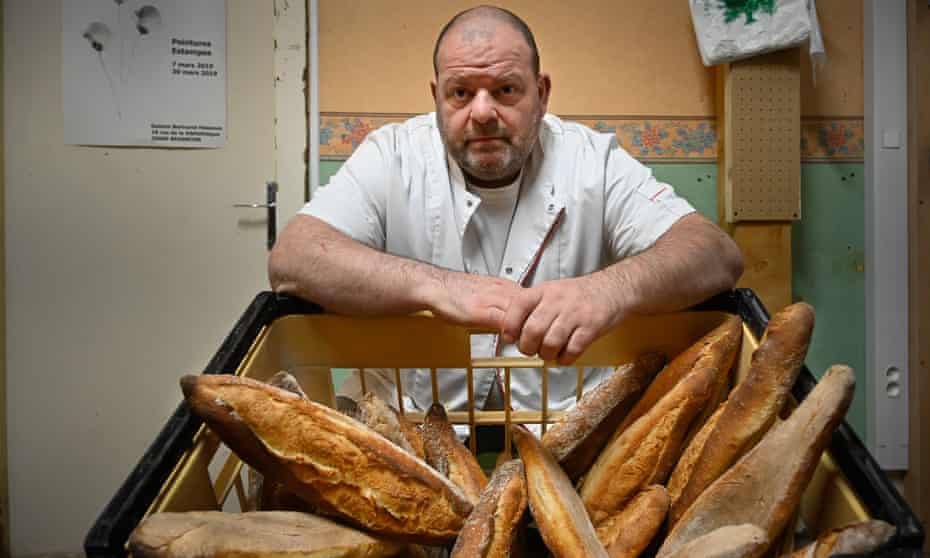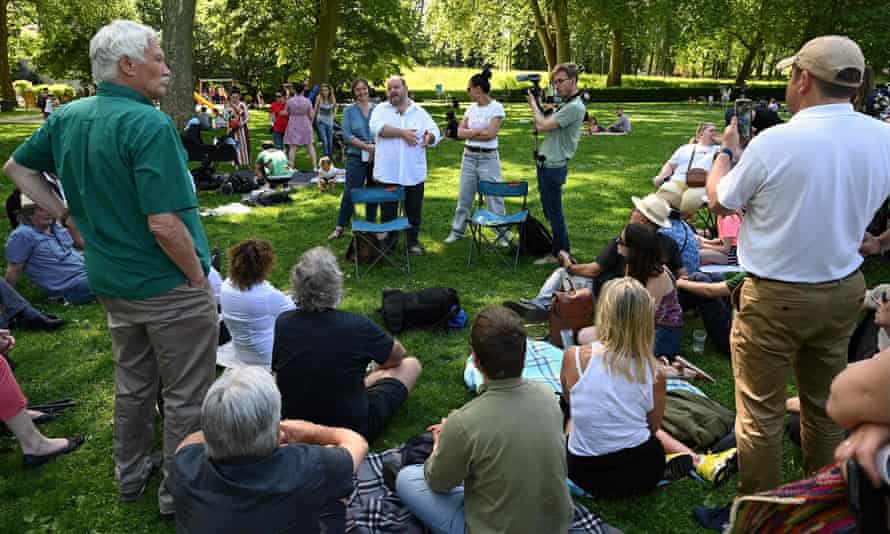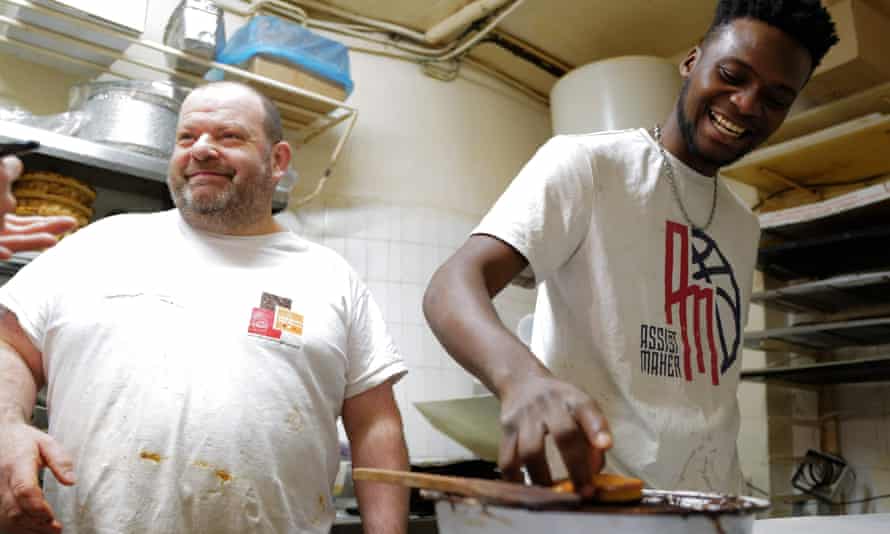Between 15 hours of baking and three hours’ sleep, Stéphane Ravacley is trying to knead a little faith back into French politics

Stephane Ravacley in 2021 during his campaign to save his Guinean apprentice from deportation. Photograph: Sébastien Bozon/AFP/Getty Images
Angelique Chrisafis in Besançon
Angelique Chrisafis in Besançon
THE GUARDIAN
Tue 7 Jun 2022
After dark in a bakery kitchen, Stéphane Ravacley was bashing blocks of butter with a giant rolling pin as he prepared his croissant pastry. “A lot of French people have lost faith in politics,” he said, shaping the first of 500 croissants. “They’re not voting, they don’t feel listened to, and it’s my battle to win them back.”
The 53-year-old baker who hails from what he calls the “bottom rung of the social ladder” has captured France’s imagination as one of the most improbable newcomers in this weekend’s first round of the parliamentary elections.
Ravacley’s outsider challenge to Emmanuel Macron’s centrist party in the Doubs near the Swiss border in eastern France is focusing attention on the newly re-elected president’s image problem as being aloof, especially concerning people’s everyday worries.
Macron is seeking a centrist parliamentary majority in order to have a free hand for his policies, such as raising the pension age and overhauling the benefits system. But turnout on 12 and 19 June is expected to be at a record low of less than 48% amid a growing mistrust of the political class. Some voters feel that the real battle will take place with street demonstrations against Macron’s policies from the autumn, so there’s “not much point” in voting, as one unemployed man said on a housing estate in the eastern town of Besançon.

After dark in a bakery kitchen, Stéphane Ravacley was bashing blocks of butter with a giant rolling pin as he prepared his croissant pastry. “A lot of French people have lost faith in politics,” he said, shaping the first of 500 croissants. “They’re not voting, they don’t feel listened to, and it’s my battle to win them back.”
The 53-year-old baker who hails from what he calls the “bottom rung of the social ladder” has captured France’s imagination as one of the most improbable newcomers in this weekend’s first round of the parliamentary elections.
Ravacley’s outsider challenge to Emmanuel Macron’s centrist party in the Doubs near the Swiss border in eastern France is focusing attention on the newly re-elected president’s image problem as being aloof, especially concerning people’s everyday worries.
Macron is seeking a centrist parliamentary majority in order to have a free hand for his policies, such as raising the pension age and overhauling the benefits system. But turnout on 12 and 19 June is expected to be at a record low of less than 48% amid a growing mistrust of the political class. Some voters feel that the real battle will take place with street demonstrations against Macron’s policies from the autumn, so there’s “not much point” in voting, as one unemployed man said on a housing estate in the eastern town of Besançon.

Stephane Ravacley (centre) delivers a speech during a campaign meeting in Besançon on 15 May.
Photograph: Sébastien Bozon/AFP/Getty Images
A historic alliance of parties on the left, led by the radical Jean-Luc Mélenchon, is seeking to make big parliament gains, and is predicted by pollsters to triple its seats and become the main opposition to Macron’s centrists. Marine Le Pen’s far-right National Rally is also seeking to increase its seats.
Ravacley, who does not belong to a political party, is running for parliament for the leftwing alliance, backed by the Greens. He argues that the French parliament, which is overwhelmingly middle-class with a high level of formal education, needs more working-class, manual labourers who understand the way French people think. He grew up in eastern France, in a poor family who worked the cereal fields. His mother died in a tractor accident when he was four, leaving his father with three children.
A historic alliance of parties on the left, led by the radical Jean-Luc Mélenchon, is seeking to make big parliament gains, and is predicted by pollsters to triple its seats and become the main opposition to Macron’s centrists. Marine Le Pen’s far-right National Rally is also seeking to increase its seats.
Ravacley, who does not belong to a political party, is running for parliament for the leftwing alliance, backed by the Greens. He argues that the French parliament, which is overwhelmingly middle-class with a high level of formal education, needs more working-class, manual labourers who understand the way French people think. He grew up in eastern France, in a poor family who worked the cereal fields. His mother died in a tractor accident when he was four, leaving his father with three children.
Ravacley is known as the “humanist baker of Besançon”. He became famous last year for going on hunger strike in defence of his Guinean bakery apprentice, Laye Fodé Traoré, an orphan who had arrived in France as an unaccompanied minor aged 16, but faced deportation when he turned 18. Ravacley’s protest tapped into national concern for unaccompanied minor migrants. Stars including the actors Omar Sy and Marion Cotillard signed an open letter to Macron on his behalf. Still, it took 11 days of hunger strike and Ravacley’s sudden hospitalisation for the authorities to make contact and begin processing Traoré’s paperwork, allowing him to stay.
“When I went on hunger strike, I was initially met with silence from the authorities and that changed me as a person,” Ravacley said. “I’ve become a monster now – a kind and gentle monster – I really understand that if you want to change things you have to fight for it.”

Stéphane Ravacley working with Guinean apprentice Laye Fode Traoré in January 2021 after the baker’s campaign to save him from deportation ended in victory.
Photograph: Sébastien Bozon/AFP/Getty Images
The baker’s campaign schedule is gruelling. He works on his croissants until 10pm, sleeps three hours, rises at 1.30 am to bake bread for his shop until midday, briefly naps, then sets off in his old Renault Twingo full of flour-sacks as he canvasses in his eastern constituency that spreads from the housing estates of Besançon to the small villages outside.
Ravacley still supports migrants who arrived as unaccompanied minors, as well as French young people leaving the care system, which has opened him to far right attacks. Last week, one of his election posters was sprayed with the Nazi swastika and racist slurs. “I’ll never give in to hate,” he said.
In an election described by pollsters as lacklustre and dull, Ravacley has become a high-profile figure. During last month’s Cannes film festival, the Dardenne brothers directing-duo, whose latest film is about young migrants in Belgium, dedicated their film to Ravacley. They called his hunger strike a “great act of resistance in our era”.
Ravacley said: “I was rolling out my croissants, as usual at that time of night, the phone rang and someone said: ‘Put on the TV, they’re talking about you at Cannes.’ Incredible.”
The town of Besançon, run by a Green mayor since 2020, saw a high vote for the left’s Mélenchon in the presidential race – he topped the poll in the first round, beating Macron and Le Pen. Ravacley’s challenge is whether the new leftwing alliance can now persuade voters to turn out again in the parliamentary elections, particularly on housing estates where abstention is high.
The baker’s campaign schedule is gruelling. He works on his croissants until 10pm, sleeps three hours, rises at 1.30 am to bake bread for his shop until midday, briefly naps, then sets off in his old Renault Twingo full of flour-sacks as he canvasses in his eastern constituency that spreads from the housing estates of Besançon to the small villages outside.
Ravacley still supports migrants who arrived as unaccompanied minors, as well as French young people leaving the care system, which has opened him to far right attacks. Last week, one of his election posters was sprayed with the Nazi swastika and racist slurs. “I’ll never give in to hate,” he said.
In an election described by pollsters as lacklustre and dull, Ravacley has become a high-profile figure. During last month’s Cannes film festival, the Dardenne brothers directing-duo, whose latest film is about young migrants in Belgium, dedicated their film to Ravacley. They called his hunger strike a “great act of resistance in our era”.
Ravacley said: “I was rolling out my croissants, as usual at that time of night, the phone rang and someone said: ‘Put on the TV, they’re talking about you at Cannes.’ Incredible.”
The town of Besançon, run by a Green mayor since 2020, saw a high vote for the left’s Mélenchon in the presidential race – he topped the poll in the first round, beating Macron and Le Pen. Ravacley’s challenge is whether the new leftwing alliance can now persuade voters to turn out again in the parliamentary elections, particularly on housing estates where abstention is high.
On the estates of Besançon’s Clairs-Soleils neighbourhood, as Ravacley knocked on doors, people said their biggest concern was making ends meet, as well as the climate crisis, but that trust in politics was low.
Outside a primary school, Ahmed, 32, an accountant collecting his two daughters, said he recognised Ravacley from TV. “It’s important to have someone in parliament who understands people’s everyday concerns, and we’re really struggling with the cost of food and petrol,” he said. “If I vote, I’ll vote for him. But I’m not really sure if it’s worth voting any more, nothing ever changes.”
Nabia Hakkar-Boyer, a regional councillor for the Socialist party, and Ravacley’s runningmate, said: “He comes across as down to earth and different to other candidates. He looks like the voters themselves, and he understands their lives. He always has flour on his trousers and he works more than 15 hours a day.”
Since the gilets jaunes anti-government protests of Macron’s first term, there has been a demand for “ordinary citizens” to play more of a role in political decision-making. Under pressure, Macron promised this month that he would set up a vast democratic consultation with the French people, but he is yet to spell out in what form.
Ravacley is not the only citizen protester who has turned parliamentary candidate this year. Rachel Keke, a hotel housekeeper who led a two-year strike for better conditions for cleaners at a hotel on the edge of Paris, is running for the left alliance east of the capital.
Meanwhile, Ravacley has even made his flour-encrusted, worn-down work shoes a campaign argument. “I’ll go to the National Assembly in my magic shoes,” he said. “They keep my feet on the ground.”
No comments:
Post a Comment